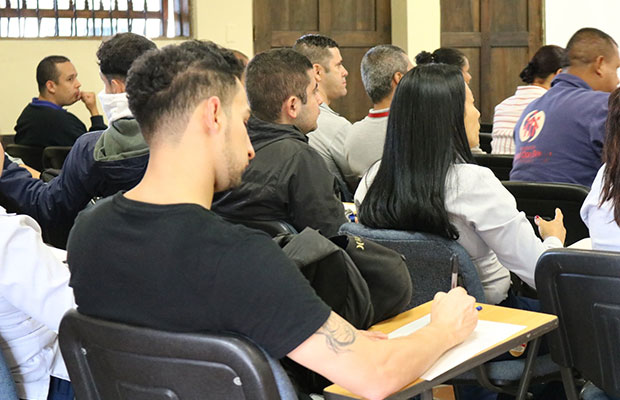
At Don Bosco City, Child Laborers Find New Hope
For more than 54 years, Salesian missionaries at Cuidad Don Bosco (Don Bosco City) in Medellín, Colombia have worked hard to rescue thousands of youth from violence and exploitation. Juan David was one of them. Now a law student at the Latin American Autonomous University, this former street kid credits his success to the opportunities he discovered at Don Bosco City.
After his father died, Juan David became the sole provider for his mom and two younger siblings. And he was only six years old! Instead of enjoying carefree days running and playing, as all children should, he spent his time rummaging through garbage from Medellín’s streets, hoping to sell anything of value to scrape together enough change to feed his hungry family. Often, these efforts weren’t enough, so he resorted to begging from strangers.
Then—creative and resourceful beyond his years—he got the idea to work as a “recycler” and became one of the countless children who scavenge Medellín’s landfills for the slightest hunk of metal, plastic or other items with potential resale value.
“These children are particularly vulnerable to the worst dangers of the streets,” explains Father Gus Baek, director of Salesian Missions. “Like Juan David— whose desperately impoverished mother was often ill and not able to properly care for her family—they do not have adequate protection. And that’s when the opportunists swoop in—the drug dealers, the gang leaders, the ‘employers’ who seek to exploit girls and boys for their hard labor. In Colombia especially, youth also risk being recruited as soldiers, lured by the false promise of security and food.”
These challenges are precisely why Don Bosco City exists. As one of the oldest and largest programs for street children in Latin America, Don Bosco City has rescued and rehabilitated more than 80,000 girls and boys whose futures—and sometimes even lives—otherwise would have been lost.
Here, Salesian missionaries offer a multi-pronged approach designed to address the broad social issues that contribute to these children’s plights—and the education they need to break the cycle of poverty for good.
The process begins with food, shelter and clothing. Salesian missionaries and lay volunteers walk the streets by day, befriending at-risk youth and encouraging them to visit Don Bosco City—where their basic needs are met, plus they have the chance to play with other children. Youth who wish to stay with the program then begin remedial education and learn valuable life skills. The third and final stage of the process culminates with job skills training or attendance at local secondary schools.
When Juan David learned of Don Bosco City, he jumped at the chance. Nearly 14 years later, he is preparing for a valuable post-secondary degree and aspires to help children who are struggling with the same disadvantages and dangers that he once did.
Childhood friends, many of whom have fallen victim to drugs, find Juan David’s reversal of fortune extraordinary. “They thought I was dead,” he says, explaining that this is far too often the case when someone disappears from the streets. “And they were amazed when I told them that my life had changed and that I was even studying at a university.”
Thanks to the generosity of friends like you, Juan David is achieving his full potential—and will use that potential to help transform even more lives. With your continued support, thousands more deserving youth can do the same.
Our mission helps end child labor and gives exploited youth hope for a brighter future. What’s your mission?
Learn more about our work in Colombia.

